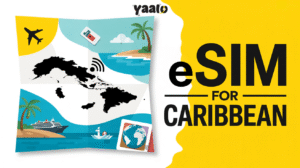Planning to study in Japan? Then you’re probably already knee-deep in research, wondering how to get through the visa process without going in circles. If you’re based in New York City, you’ve likely typed “Where can I get a Japanese student visa in NYC?” into Google more times than you’d like to admit.
What is true about this is that the process can feel overwhelming at first. There’s paperwork, embassy visits, and a fair amount of waiting involved. But once you know the steps, it becomes a lot more manageable. And that’s exactly what this guide is for.
No matter where you are going, we can help you.
This includes Japanese universities, language schools, and cultural exchange programs. We will explain how the student visa works, what you need, where to go, and how long it takes.
We will also discuss what to expect when working with the Consulate General of Japan in NYC. We will explain how to stay connected in Japan using an eSIM instead of searching for local SIM cards.
Let’s get you one step closer to Japan and make sure no detail is left behind.
Understanding Japanese Visa Categories: What International Students Need to Know
Before booking your flight or applying to a school in Japan, it’s important to know the different visa types. You should find out which one is best for your situation. Japan offers several visa categories depending on how long you plan to stay and what you’ll be doing there.
1. Short-Term Stay Visas (Up to 90 Days)
These are best for people visiting Japan for tourism, short courses, family visits, business meetings, or academic conferences. They’re valid for up to 90 days and don’t allow for employment or long-term study.
2. Long-Term Stay Visas (Over 90 Days)
If you’re planning to live in Japan for an extended period—whether for work, full-time education, or internships—this is the category you’ll need. These visas require more documentation and typically involve coordination with your host institution or employer.
3. Transit Visa
This is for travelers who are simply passing through Japan on their way to another destination. It allows a brief stay, typically no more than a couple of days.
4. Student Visa (Ryugaku Visa)
If you are going to Japan to join a university, language school, or any program that lasts over 90 days. In that case, you’ll need to apply for a Student Visa—also known as the Ryugaku Visa. This visa is specifically tailored for academic studies and allows for part-time work under certain conditions.
Knowing which visa applies to you is the first major step in preparing for your time in Japan. Make sure you apply for the correct one to avoid delays or complications later.
The Japanese Student Visa (Ryugaku Visa): What You Need to Know Before Applying
If you plan to study in Japan for over 90 days, you will need the Ryugaku Visa. This is also called the Japanese Student Visa.
It is the official permit that lets international students live in Japan legally. This is while they are enrolled in a recognized school.
Whether you’re joining a university, language school, or vocational program, this visa is your gateway to life and learning in Japan.
What Is the Ryugaku Visa For?
The authorities created the Ryugaku Visa for students pursuing mid-to-long-term academic programs. It gives you the legal right to stay in Japan while you study. In many cases, it also allows part-time work. You can work up to 28 hours per week to help with your living expenses.
Who Can Apply?
To be eligible, you’ll need to meet a few key requirements:
1. Official Admission Letter
You must have secured a spot at a recognized institution in Japan. This includes universities, language schools, or specialized training colleges.
2. Proof of Financial Stability
The Japanese immigration services agency requires proof of self-support during your stay. You will need recent bank statements, a letter of financial support from a sponsor, or scholarship proof.
3. Health and Documentation
While Japan doesn’t typically require a health certificate, your application should be thorough and clean. Make sure all forms are complete, consistent, and free from errors. Having copies of your academic transcripts, passport, and personal identification ready will streamline the process.
How Long Is the Student Visa Valid?
Student visas in Japan are usually issued for 6 months, 1 year, 1.5 years, or 2 years—depending on your program’s length. If you continue your studies or transfer to another institution, you can apply to extend your visa before it expires. Always keep an eye on the expiration date, as overstaying can lead to penalties or future re-entry restrictions.
Application Process at The Consulate General of Japan in New York!
Jurisdiction
The Consulate General of Japan in New York serves residents of:
- New York State
- Delaware
- New Jersey
- Pennsylvania
- Puerto Rico
- U.S. Virgin Islands
- West Virginia
- Fairfield County, Connecticut
Ensure you reside within this jurisdiction before applying. Consulate General of Japan in New York+1VisaGuide World+1
Appointment Scheduling
Visa applications require an online appointment. Walk-ins are not accepted.
Submission Methods
- In-Person: Submit documents directly at the Consulate.
- By Mail: Include a self-addressed, stamped envelope and all required documents. Note that incomplete applications will be returned.
Processing Time
Standard processing takes 4-7 business days. However, certain cases may require referral to the Ministry in Japan, extending processing to 1-2 months.
Visa Fees
As of April 1, 2025:
- Single-entry visa: $20
- Multiple-entry visa: $40
- Transit visa: $5
Fees are payable in cash upon visa pickup.
Required Documents
Certificate of Eligibility (COE)
Issued by the Japanese institution, the COE confirms your eligibility for a student visa.
Valid Passport
Must have at least two blank pages and be valid for the duration of your stay.
Visa Application Form
Complete and sign the official form, available on the Consulate’s website.
Photograph
A 2×2-inch photo taken within the last six months, with a plain background.
Proof of Financial Means
Please provide bank statements or financial documents from a sponsor. These should show enough funds, around $10,000 to $15,000, to cover tuition and living costs.
Additional Documents
- Academic transcripts
- Letter of admission
- Proof of residence
- Letter of guarantee (if applicable)
eVisa System
The eVISA system is currently available only for short-term tourism visas. Student visa applicants must apply through the Consulate.
Common Challenges and Solutions for Japanese Student Visas
Missing Papers Can Set You Back – So Triple-Check Everything
One of the easiest ways to get stuck in visa limbo is by forgetting to include a document or filling something out wrong. It happens more often than you’d think.
Before you submit anything, check the list at least twice. Make sure you have your passport, visa application form, Certificate of Eligibility, photos, and financial proof. Even something as small as a missing signature can slow things down. When in doubt, ask the consulate or someone who’s gone through it before.
Money Matters (and How to Show It Clearly)
One of the most common reasons student visa applications get delayed — or worse, rejected — is unclear proof of finances. Make sure your bank statements clearly show that you’ve got enough to cover tuition and living expenses.
If someone else is paying, like a parent or sponsor, you need to submit a letter from them. This letter should explain their support and include their financial documents. Don’t skip this step — the consulate really wants to see where the money is coming from.
The Waiting Game: Why Timing Is Everything
Japanese student visas don’t get processed overnight. Some people get theirs in a couple of weeks, while others wait over a month. The smart move? Apply early — ideally as soon as you get your Certificate of Eligibility. That way, any unexpected delays won’t mess with your travel plans.
Yes, You Might Have to Talk to Someone
In some cases, you could be called in for an interview. It’s nothing to worry about — just be ready to explain why you’re going to Japan, what school you’ll attend, and how long you’ll be staying. Keep it honest. Keep it simple, and you’ll be fine.
After Your Visa Is Approved: What to Do Before the Big Move?
Lock in Your Flight Early
Once your student visa is approved, it’s time to plan your journey. Make sure your flight dates fall within the start and end dates on your visa. Booking early not only saves money, it gives you more options in case you need to adjust plans.
Sort Out Your Housing Ahead of Time
Don’t wait until you land to look for a place to live. Whether you’re staying in a dorm, a guesthouse, or a private apartment, secure your accommodation before you go. Some schools offer support with this, so ask your Japanese institution if they can help.
Sign Up for Health Insurance When You Arrive
Japan requires all residents—including international students—to join the National Health Insurance system. It costs around USD 150 a year and covers about 70% of your medical bills. You’ll register for it at your local city hall after landing, so keep that on your to-do list.
Get to Know the Culture Before You Land
A little prep goes a long way. Learn a few key Japanese phrases and brush up on customs like bowing, shoe etiquette, and how to use public transportation. It’ll make your first few weeks smoother—and help you feel more confident as you settle in.
Staying Connected in Japan: A Student’s Guide to Easy Mobile Access
Why Staying Connected Is Non-Negotiable?
Moving to Japan for your studies brings plenty of excitement and a few practical concerns. One of the first things you’ll need is a way to stay in touch.
Fast mobile data is important. You need it for checking in with family. It helps you manage campus life. It is also useful for using maps in Tokyo.
The Shift Toward eSIM: No More SIM Card Hassles
Many students now skip the traditional SIM card route. Instead of landing in Japan and scrambling to find a local shop, they activate an eSIM for Japan.
A digital SIM you can set up before your trip. With no physical card, no shipping, and no contracts, it’s a faster and more flexible option. You get online immediately after landing, which is perfect when you’re trying to sort transport, accommodation, or school details on day one.
Why Students Trust Yaalo eSIM for Japan
Yaalo eSIM offers prepaid data plans that are perfect for students studying in Japan. There’s no paperwork or complicated sign-up process. You pick your plan, install the eSIM with a quick QR scan, and you’re ready to go. It’s cost-effective, works across major Japanese cities, and gives you the freedom to focus on your studies, not your phone bill.
Conclusion
Getting a Japanese student visa from New York City may feel overwhelming at first, but with the right information and a bit of preparation, the process becomes much more manageable.
- You need to collect documents.
- Learn about different visa types.
- Follow the rules of the embassy.
Each step brings you closer to your dream of studying in Japan.
With Yaalo eSIM, you can set up mobile data before you even board the plane, so your first call or message from Japan goes out without a hitch. It’s one less thing to worry about and one more reason to feel prepared as you step into your next chapter.
FAQs
How do I get a Japanese student visa from New York?
Start by applying to a recognized Japanese school. Once accepted, you’ll receive a Certificate of Eligibility. Then, submit your visa application to the Japanese Consulate in NYC with your documents and passport.
Where is the Japanese Consulate located in NYC?
The Consulate General of Japan in New York is located at 299 Park Avenue, 18th Floor, New York, NY 10171. Always check their website for the latest hours and application details.
How long does it take to process a student visa for Japan?
Once you’ve submitted everything, it typically takes 5 to 10 business days to process, though this can vary, so it’s best to apply early.
How much money do I need to show for a student visa?
You should show at least ¥1,000,000 to ¥2,000,000 (around $7,000–$15,000) to cover your tuition and living expenses for the first year.
Do I need health insurance in Japan as a student?
Yes. Once you arrive, you’ll need to enroll in Japan’s National Health Insurance, which is affordable and covers about 70% of medical costs.
Is it better to get a SIM card or an eSIM in Japan?
For students, an eSIM is far more convenient. With Yaalo eSIM, you can set up data access before you land—no contracts, no local stores, no hassle.









